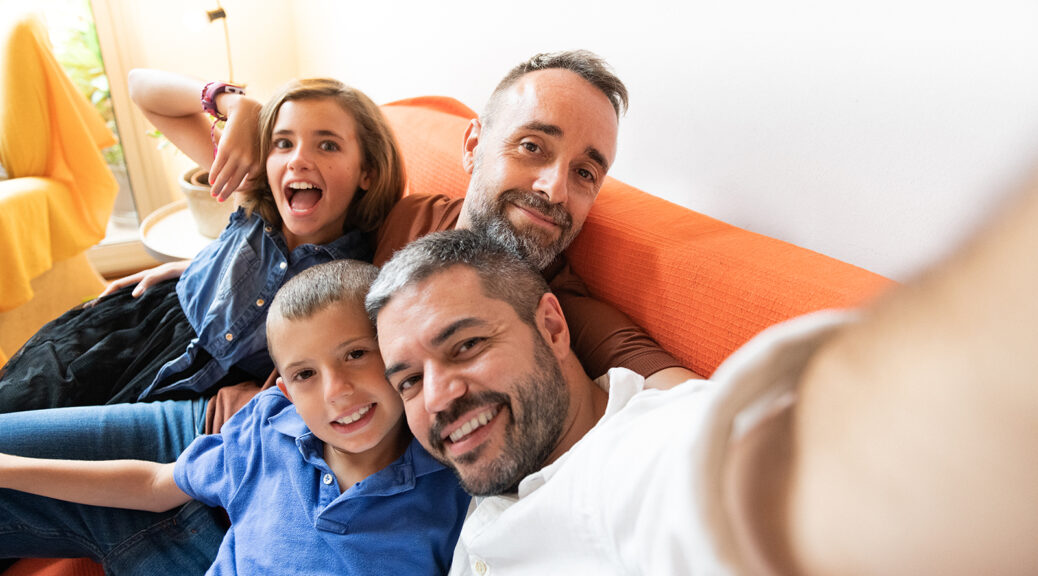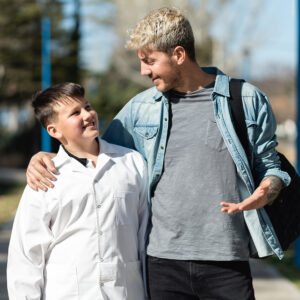Pride in Caregiving: Celebrating LGBTQIA+ Foster Parents & Their Impact

Every person deserves compassion, love and to be accepted as who they truly are. When we feel seen and heard, it validates our fundamental human need for connection. This validation tells us that our thoughts, feelings, identity and actions are meaningful and that we matter in our community. For LGBTQIA+ young people, this is not always the case. But with the help of LGBTQIA+ foster parents and allies, children can find the love and support they need to thrive.
Every action you take to support LGBTQIA+ youth has the potential to save a life and help create a much-needed support system. At KVC Kansas, we’re here to support every child we serve and provide the best possible resources for their care. Did you know that if you’re an LGBTQIA+ adult, you can foster or adopt? It’s true! Learn more about becoming a foster parent.
So, why does representation matter, and what realities do LGBTQIA+ young people face without support? Why should people who identify as part of the LGBTQIA+ community consider foster parenting, and how can LGBTQIA+ children receive care that validates their identities? Let’s explore.
Why Representation Matters for LGBTQIA+ Children, Parents and Families
 Feeling accepted for who they are without conforming to others is a value that no child should have to compromise. But particularly for children in foster care who have diverse identities, this acceptance can be invaluable in a caregiver. As Dani Martinez, Grant Manager with KVC Kansas and Member of the KVC Kansas DEI+B Council, says, “When youth see themselves in examples of healthy adults, it gives them a sense of security that they don’t have in other homes.”
Feeling accepted for who they are without conforming to others is a value that no child should have to compromise. But particularly for children in foster care who have diverse identities, this acceptance can be invaluable in a caregiver. As Dani Martinez, Grant Manager with KVC Kansas and Member of the KVC Kansas DEI+B Council, says, “When youth see themselves in examples of healthy adults, it gives them a sense of security that they don’t have in other homes.”
LGBTQIA+ teens might have questions about how they should dress, questions about medical and gender-affirming care or questions about relationships. These questions aren’t unique to LGBTQIA+ youth, of course. Caregivers of all identities can offer compassion, support and a safe space to address these questions. But caregivers from the LGBTQIA+ community can support young people from a place of shared experience. Young people may feel more comfortable talking and sharing their thoughts and feelings with a LGBTQIA+ foster parent who has a more personal understanding and can honestly say, “I’ve been there.”
“It’s incredibly meaningful when LGBTQIA+ children can see themselves reflected in their caregivers,” Lydia Fuqua said.
Depending on a child’s background, they may feel shame or guilt around their identity or sexuality. This is often a vulnerable subject for children, teens and even some adults. Knowing that they can share this vulnerable part of themselves with a caregiver could allow more open communication and a closer relationship. During an already-stressful time of life, this can help address the child’s anxious thoughts. This can be a game changer for LGBTQIA+ young people in foster care.
Realities LGBTQIA+ Children Face Without a Supportive Home
In addition to facing potential discrimination at school, work and in other contexts, LGBTQIA+ children are also at an increased risk of suffering from abuse and neglect at home. “It is even a reality that they are kicked out of their home, or that they leave on their own terms,” Martinez says, “because the abuse and neglect are so severe that they would rather be homeless.”
Research states that about 30% of children and teens entering foster care belong to the LGBTQIA+ community. Although there are quite a few LGBTQIA+ caregivers, there are still many instances when these children get placed into homes where they still feel misunderstood and don’t receive the specialized care they need — leading to a continued disadvantage.
Struggling through additional disadvantages includes the fact these children pay higher rates for medical care and mental health care, and they are also at a higher risk to suffer from depression, anxiety and personality disorders, leading to suicidal thoughts or actions.
The disadvantages for LGBTQIA+ children in foster care stay with them throughout their lives. Once they become legal adults and are out in the world on their own, the realities they have lived with don’t disappear, and they may become involved with the criminal justice system or homeless.
Why Someone with an LGBTQIA+ Background Should Consider Becoming A Foster Parent
 Adults in the LGBTQIA+ community have a lot to offer children experiencing foster care and can make a big difference in their health, safety and happiness. Lydia and Lacey Fuqua, who are both LGBTQIA+ and foster caregivers, are one such couple driven to make a difference in the foster care world.
Adults in the LGBTQIA+ community have a lot to offer children experiencing foster care and can make a big difference in their health, safety and happiness. Lydia and Lacey Fuqua, who are both LGBTQIA+ and foster caregivers, are one such couple driven to make a difference in the foster care world.
“It’s a really special way to build a family,” Lydia says. “And it’s more than just within our immediate family because we now have extended family from the reunification of one child previously in foster care.”
For Lydia and Lacey, the importance of diversity and representation in foster care, and the positive impact that it makes on young people is personal. “It’s incredibly meaningful when LGBTQIA+ children can see themselves reflected in their caregivers,” Lydia explains.
It’s important to note that learning opportunities are abundant with caregivers of the LGBTQIA+ community. Children who identify similarly have a safe space to be themselves. And children who are growing into themselves are free to explore their identity without the fear of consequences. They’ll gain an education and have a more well-rounded knowledge about the LGBTQIA+ community and will likely have more respect going into adulthood.
Worried you don’t have what it takes to be a foster parent? No matter the child, and no matter your background, Martinez shares this affirmation: “You have what these children need.” For more information on becoming a foster parent with KVC, look here.
Tips for Caregivers on Supporting LGBTQIA+ Children
No matter an adult’s background, there are some important steps that caregivers should take to support LGBTQIA+ children who are in foster care. Some strategies include:
 Have the difficult conversations: Opening up to the most vulnerable parts of ourselves is difficult, and can be even more difficult for a child with a traumatic background. Ask difficult questions so that caregivers can understand and provide the best care possible.
Have the difficult conversations: Opening up to the most vulnerable parts of ourselves is difficult, and can be even more difficult for a child with a traumatic background. Ask difficult questions so that caregivers can understand and provide the best care possible.- Support gender identity: Gender-affirming care is needed between a caregiver and a child in foster care. Acknowledging their identity and supporting the necessary mental, physical and medical needs (especially those approved by their team of professionals) will go miles in the positive health and wellbeing of the child.
- Educate yourself: Especially for caregivers who haven’t had an opportunity to understand, take the initiative to show interest and learn about an LGBTQIA+ child’s identity. A little research can go a long way, and it can also be helpful to have intentional conversations with medical and mental health professionals.
- Practice acceptance: No matter what, children (regardless of how they identify) are just children. And they’re human. They’re figuring out the world, and themselves, and will benefit from care and support.
- Find, join or create a support group: Connecting with others in a similar situation helps you know you’re not alone in this journey. This can be a formal support group, but can also be an informal circle of people in your corner who can offer good ideas and a compassionate ear. This circle could include the child’s medical and mental health teams, as well as team members from KVC.
Curious to explore more about foster parenting? KVC Kansas can help! Explore foster opportunities and get in touch with our team.
